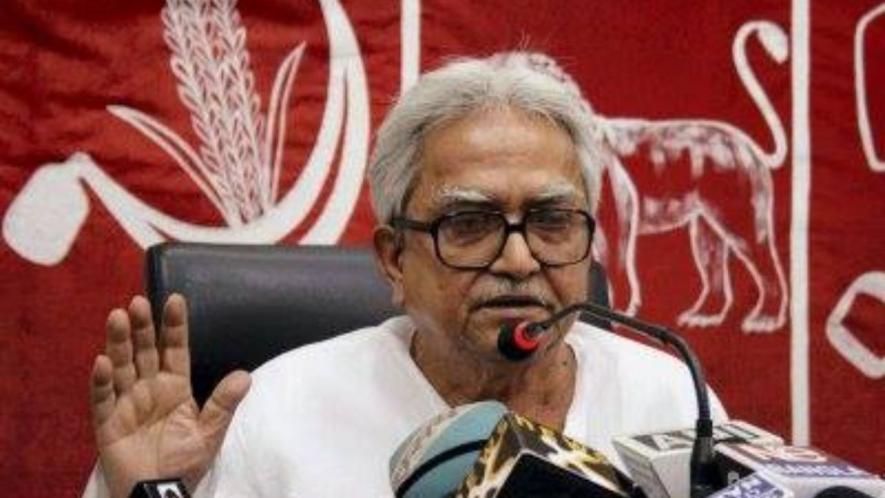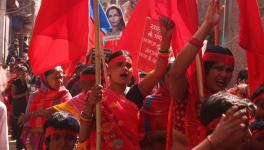Bengal Panchayat Polls: Left Front Manifesto Assures Safety Net for Migrant Labour, Families

File photo.
Kolkata: The West Bengal Left Front has promised the implementation of alternative programmes, if voted for, in the impending 10th panchayat elections in the state on July 8.
Left Front Chairman Biman Basu along with constituency representatives of the Left Front, in a press conference held at Muzaffar Ahmad Bhawan in Kolkata, unveiled the manifesto here on Wednesday.
After the unveiling of the manifesto, Basu said, "It was the Left Front that had modelled the panchayats into a three-tier devolutionary power structure and later it was replicated throughout the country. Now after coming to power, the TMC (Trinamool Congress) has turned the panchayats into a looter's paradise”
To thwart TMC’s “misrule”, Basu appealed to all voters to ensure the victory of Left Front candidates in all the three tiers of the panchayat system.
He also promised that if voted to power in the panchayats, the Left Front would implement pro-people alternative policies.
The LF manifesto also called for “defeating the communal BJP and to free the state from the clutches of corrupt TMC.”
In the manifesto, the Left Front aims to construct a safety net for the migrant labourers of the state. It should be noted that without any industry coming up in the past few years, a sizeable portion, about one crore, of the state population had to leave the state in search of employment and is now working in other states, while in most cases their families are languishing in their village homes.
The Left Front chairman said migrant labourers were doubly exploited. First, in the hands of middlemen who give them work, and then at the hands of their contractor and employers. Many of them lack security while working in other states. He also said that if voted to power, the gram panchayats would work towards building a live relationship with migrant labourers.
For this, a register would be maintained at the zilla parishad level through the village panchayats, in which the number of villagers who go to other states for work would be noted, and their appointers’ names and phone numbers too.
Basu said the Left-led gram panchayats would help migrant labourers if they face any workplace problem, and for those coming back, alternative work would be arranged at the panchayat level by the concerned panchayat. A dedicated portal for migrant workers would also be started, he assured.
It may be recalled that in 1977, the then Chief Minister Jyoti Basu had said that the LF government wouldn’t work for the secretariat only, rather it would create a live relation with rural Bengal by strengthening the panchayats as also maintaining the local urban bodies.
West Bengal had developed its own strong panchayat institutions much before the 73rd constitutional amendment was made by the Rajiv Gandhi government to start the panchayati raj system throughout the country.
However, after the Left Front was voted out of power in 2011, the panchayats have been changed and their power is now centralised in the hands of a rich few, said Basu, adding that practices like the regular Gram Sansads to ensure devolution of power to the masses “have been abandoned.”
The LF manifesto suggests that panchayats would work towards putting a ceiling on the fares of the mass transportation system in villages, and in the case of risky work, insurance for workers would be made available. In case of deaths due to snake bites, lightning, or man-animal conflict (even if houses are damaged in elephant attacks), the compensation package would be doubled and paid within a minimum stipulated time.
Through the implementation of the Amar Bari project, all persons without a house would be given one to stay in, the manifesto promises. It also proposed a decision to re-start a provident fund for landless agricultural labourers and farmers. Recall that it was under the Left Front regime, that schemes like Kanyashree, or rice at that rate of Rs 2 per kg, were introduced, he added.
The manifesto has also assured that all schemes that benefit the economically backward sections of the population would remain active in the state. Anganwadis would be strengthened and all students from economically backward sections of the population would be provided education, health, and nutrition free of cost up to the Madhyamik level, the LF promised.
The manifesto also promised to upgrade rural libraries and renovate them as rural information technology hubs.
Among the other promises made are that all aged people who have nowhere to go would be provided cooked meals twice a day and special emphasis would be given to their well-being.
Student hostels for Scheduled Caste and Scheduled Tribe students would be restarted and the cooperative movement would be strengthened to give loans, insurance benefits, fertilisers at fair prices, among others, as per the manifesto.
Get the latest reports & analysis with people's perspective on Protests, movements & deep analytical videos, discussions of the current affairs in your Telegram app. Subscribe to NewsClick's Telegram channel & get Real-Time updates on stories, as they get published on our website.
























